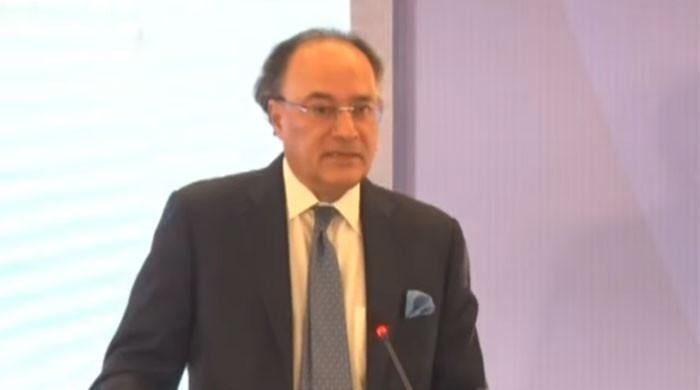Swiss central bank chief quits over wife's currency deal
BERNE: Swiss National Bank Chairman Philipp Hildebrand resigned with immediate effect on Monday, saying he could not prove he had been unaware of a currency trade made by his wife and wanted to...
January 10, 2012
Hildebrand's decision to relinquish one of the world's top central banking jobs after just two years came as Swiss parliamentarians met to discuss the scandal, which erupted last week after Sarasin bank sacked an employee who leaked details of the trade to a political opponent of the central banker.
Hildebrand's wife Kashya, a former hedge fund trader who now runs a Zurich art gallery, bought 400,000 Swiss francs ($418,000) worth of dollars on August 15, three weeks before her husband oversaw steps to cap the rise of the safe-haven franc. She later sold the dollars at a higher rate.
At a news conference four days ago, Hildebrand had resisted calls to step down, saying he only learned of his wife's trade the day after she made it and rejecting claims that he had personally authorized the currency deal.
But he told reporters on Monday he could not provide final evidence that he had been unaware of the trade and had decided to step down as he realized the intense public scrutiny over the affair was compromising his credibility.
"I have come to the conclusion that it is not possible to provide conclusive and final evidence that my wife did indeed initiate the foreign exchange transaction on the 15th August without my knowledge," he said.
"The fact is: my word is my bond. I had no knowledge of my wife's transaction on that day," he said.
Christoph Blocher, a leading figure in the right-wing Swiss People's Party (SVP) who had long called for Hildebrand's head and who handed over documents on the currency trades to the government, welcomed his resignation.
"There is no central bank in Europe where the board president can do something like that," he told a news conference. "In the whole of Europe a central bank with a president like Hildebrand would have been written off."
It has been a roller coaster career for the 48-year-old who joined the SNB in 2003 after working for U.S. hedge fund Moore Capital, winning praise for helping rescue big Swiss bank UBS in 2008 but then criticism when the central bank ran up a record loss as it tried to weaken the safe-haven franc in 2010.
Until the trading scandal erupted, Hildebrand's star had been in the ascendant again after the SNB managed to cap the soaring franc without big new interventions and as parliament approved tough new bank capital rules he had championed.
He was also appointed vice chairman of the Financial Stability Board (FSB), a global regulator, in November, a position he similarly relinquished on Monday.
FSB chairman and Bank of Canada governor Mark Carney, who studied with Hildebrand in Oxford, said his departure was a loss.
"Philipp has been instrumental in helping to manage the response to the global financial crisis and in developing major reforms to strengthen the resiliency and stability of the international financial system," Carney said.
FOUGHT LIKE A LION
Hildebrand said he had decided the mounting pressure might hurt his ability to take tough decisions to address what he called "probably the most threatening economic and financial situation since the Second World War."
"I am sad to take this step, I loved this job, I fought like a lion for it," he said, adding that he had realized that it was probably time to go after Swiss media examined his every move, including where he ate and what his wife was wearing.
In a statement, his wife Kashya apologized to the Swiss people and to her husband for costing him his job.
"I failed my husband by not considering the perception of a 'conflict of interest' created by my purchase of dollars," she said. "My husband is a man of the utmost integrity, and I deeply regret that my actions might have led anyone to question this."
Bank of England Governor Mervyn King, who chairs a regular global meeting of central bankers, said he and his colleagues were saddened by the Hildebrand's resignation.
"We all know that he is a man of total integrity, extraordinary ability and, most important of all, courage. Such people are rare. His country will miss him," King said.
The SNB's supervisory council said Vice Chairman Thomas Jordan, who joined the SNB in 1997, would take over as chairman for the time being and it would discuss on Tuesday how to proceed on filling the free position on the three-member governing board.
Jordan stressed his determination to enforce the cap on the franc at 1.20 per euro the SNB imposed on September 6.
The Swiss franc, which Hildebrand has fought to stop soaring on safe-haven buying driven by the euro zone debt crisis, rose slightly on the announcement, trading up 0.2 percent at 1.2132 per euro and 0.5 percent higher against the dollar.
"The market can distinguish between the Hildebrand case and the monetary policy case. I don't see any big implications for Swiss monetary policy, and I think they'll be able to defend the cap," said ZKB economist David Marmet.
The Swiss government said it hoped the SNB would be able to turn its full attention back to monetary policy. "The stability and credibility of the SNB are essential for the economy and for the good of the country," it said in a statement.
After his announcement, Hildebrand appeared before the parliamentary economics committee alongside the head of the SNB's supervisory council, Hansueli Raggenbass, who said it would be good to have a personnel reshuffle in the council.
The SVP's Blocher said Raggenbass would also have to go.
SNB RULES SCRUTINISED
The SNB council said on Saturday it would overhaul its internal rules concerning own trading by board members and examine all transactions they made over the past three years.
Hildebrand admitted the scandal had revealed shortcomings in the SNB's internal regulations and code of conduct.
"The focus now should be on resolutely eliminating these weaknesses. This will allow the SNB to retain its credibility, which is its greatest asset," he said.
Christoph Darbellay, the Christian Democrat chairman of parliament's economic committee that Hildebrand addressed, said it would push the SNB to tighten its rules.
"People who can have an influence on the currency should keep their hands off," he said.
Darbellay said the committee would also look into the breach by the whistleblower and the SVP of Switzerland's cherished banking secrecy, already under global fire in recent years for helping wealthy foreigners hide their assets from the taxman.
"The breach of bank secrecy and using it for political goals, that was grave," he said.
The former Bank Sarasin employee accused of leaking the data is called Reto Tarnutzer, Reuters has learned.
Tarnutzer, who leaked details of the trade to Blocher's lawyer, was quoted on Monday before Hildebrand's announcement saying he had never wanted the private bank details made public.
"I wanted to achieve clarification and not an issuing of data," he wrote in a letter sent to several Swiss dailies.
He described the SVP's decision to hand over the information to the media as "ruthless," saying that the breach of bank secrecy endangered his future: "Here a potentially only small crime was fought with a bigger crime."
The psychiatric clinic where Tarnutzer was reportedly admitted after an apparent suicide attempt declined to comment. (Reuters)











